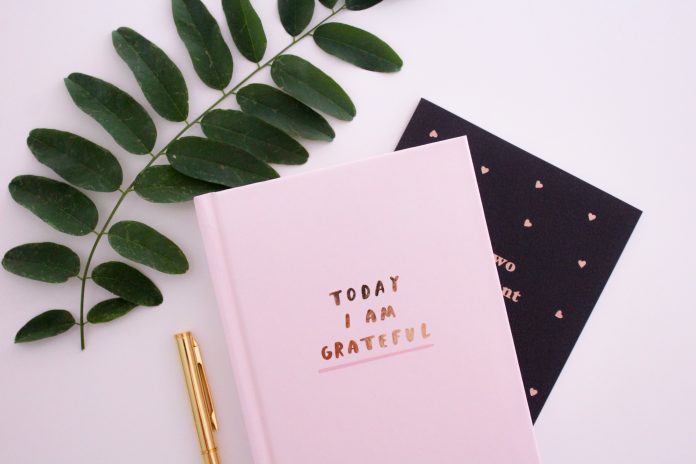After living by the rules of 50 self-help books, this one stuck.
or three years, I followed all the rules of a different self-help book for two weeks at a time: eating what the books said to eat; talking as the books said to talk; waking, sleeping, decorating, and interacting with my husband according to each book’s doctrine. I was recording it all for a reality-show podcast called By the Book with my friend and co-host, Jolenta Greenberg.
Predictably, some of the guidance we encountered didn’t work at all. Some of the duds were waking up early, dieting, and living by the law of attraction. But some of the principles we picked up on our self-help journey really did make our lives better. One big winner: practicing gratitude.
At least 10% of the books we lived by included some approach for practicing gratitude, but my favorite came from A Simple Act of Gratitude by John Kralik. In a single year, Kralik set out to write 365 thank-you notes. Initially, he did it as a way to feel less hopeless during a time when he wasn’t sure his life was worth living. But with each letter he wrote and tracked, he was able to literally count his blessings. At the same time, the act of sitting down each day with pen and paper helped to retrain his brain to focus more on the good things in life and less on the bad.
But Kralik didn’t just write letters. He also made a practice of answering simple how-are-yous with things he was grateful for rather than complaints. When he was feeling down, he would play the Glad Game, which he first learned about while reading Eleanor H. Porter’s classic children’s book Pollyanna to his daughter. In the Glad Game, players list all the things they’re happy about, as a way to muster the fortitude to get through life’s challenges.
During the time I was living by Kralik’s book, the branch of the company I was working for had just decided to fold. I was worried about my direct reports and concerned for myself. And on top of that, I had medical issues that required surgery. I was feeling down.
Gratitude gives me a break from despair.
But writing thank-you letters helped me to feel better. I wrote a note to each person on my team who was let go, thanking them for all their hard work and for making my life happier. I wrote to my doctors, thanking them for their care and support. And I even wrote a letter to the boss who made the final decision to close my department, thanking him for all the opportunities he gave me over the years.
These letters allowed me to focus on how fortunate I was — not just for good medical care and good opportunities, but for all the people in my life whom I was lucky enough to know and feel supported by. How much more horrible would my life be had I been forced to face all my troubles alone? Writing thank-you notes reminded me I wasn’t alone, and I probably never would be.
I also found that practicing gratitude was just plain fun. It is so much more joyful than looking at all the ways life is imperfect, or envying others who have more. It is a true joy to admire birds and be thankful we live in a world where animals can fly. It is a pleasure to tell my husband I appreciate all he does for me and feel the gratitude in my bones.
Of course, I’ve had people ask me, “How can you be so grateful and be a do-gooder at the same time? Doesn’t one negate the other? Doesn’t a relentless focus on gratitude mean you’re turning a blind eye to climate change and racism and all the other issues you’re actively trying to fight?
Here’s the thing: I honestly don’t believe that being thankful makes me blind to the world’s ugliness. Rather, I think it reminds me of what I’m fighting for. Those birds in the sky that I’m so thankful for? They’re part of what I want to save. Also, gratitude gives me a break from despair. If all I did every minute of everyday was lament the negative things in the world, I suspect I’d eventually stop getting out of bed. What fighting could I do then?
And gratitude helps to sustain relationships. Relationships are necessary for any good fight. We can’t be in this alone. Telling people we value them and their contributions is the least we can do.
Now, before I wrap this up, I feel it’s only right for me to mention that Jolenta had mixed feelings about Kralik’s book at first. Focusing on thanks every day reminded her of all she should be thankful for, but it also reminded her of the fact that she took a lot of things in her life for granted. Combined, those feelings made her wonder, What’s wrong with me? Why can’t I just be thankful for what I have? This book makes me feel like a jerk.
But then, as per the book’s instructions, Jolenta got out of her head. She turned her internal gratitude practice into an opportunity for outward-facing connection. She reached out to people like her grandmother, with whom she hadn’t spoken in a while, and thanked them for being in her life. And when Jolenta and her husband, Brad, played the Glad Game, their shift from frustration to humor to tenderness was palpable.
By the end of our two weeks with Kralik, even Jolenta — the erstwhile gratitude skeptic — felt her life improved. And for me, giving thanks each day made truly tough times more bearable. For that, I’m thankful.
Kristen Meinzer -Forge.medium.com

Putting a spotlight on business, inventions, leadership, influencers, women, technology, and lifestyle. We inspire, educate, celebrate success and reward resilience.















